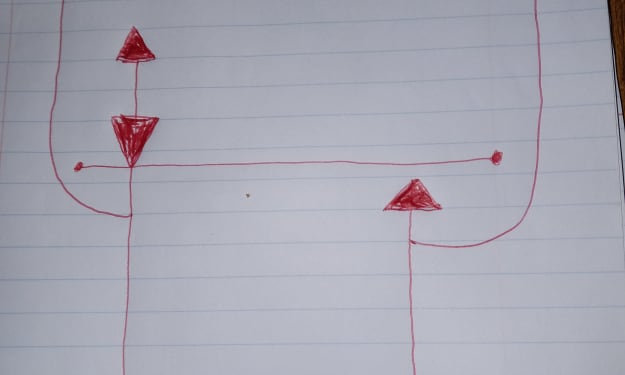Did Hermann Hesse Meet Aleister Crowley?
We Are Men, Not Stars

I revisited Klingsor's Last Summer by Hermann Hesse. I read it again because I recalled from my first reading a chapter entitled “The Music of Doom”, in which the protagonist, Klingsor, has a brief spat with an Armenian astrologer about the notion that all suffering is an illusion. The wisdom of the Magi, the Armenian calls it. Klingsor throws his drink to the ground and spits out a friendly diatribe:
“The old fox knows a great deal; he has come out of a deep and hidden den. He knows a great deal, but he does not understand us. He is too old to understand children. He is too wise to understand fools. We who are about to die know more about death than he. We are men, not stars. See my hand, holding a small blue cup of wine! This hand, this brown hand, can do many things. It has painted with many brushes, has wrested fresh segments of the world from the darkness and placed them before men's eyes. This brown hand has stroked many women under the chin and seduced many girls. Many have kissed it, tears have fallen on it, Tu Fu has written a poem to it. This dear hand, friends, will soon be full of earth and maggots; none of you would touch it then. Very well, that is the reason I love it. I love my hand, I love my eyes, I love my soft white belly; I love them with regret and with scorn and with great tenderness because they all wither and decay so soon.”
Emphasis in bold italic mine. When I read this in my twenties, I was still deeply engaged in Thelema, the religion started by Aleister Crowley. Though I ultimately abandoned Crowley’s system, both his work and Klingsor’s diatribe struck a chord which resonated into my forties. I searched in vain for any connection between Crowley and Hesse.
They were contemporaries, after all. Klingsor's Last Summer was written in Italy circa 1919, only a short while before Crowley would move to Sicily to found the Abbey of Thelema. Hesse was undoubtedly aware of the occult movement which arose out of the late nineteenth century, of which Crowley was a part. Hesse was very familiar with Jungian psychology, which borrows heavily from occult symbolism, and which Hesse explored thoroughly in his novel Demian.
As a literary critic, Hesse only wrote good reviews. If he read something he didn't like, he remained silent about it. Did he read The Book of the Law, and/or other of Crowley's works, and omit an official response, but then write it through the mouth of Klingsor?
I believe so. It is possible this was not a response to Crowley, but to the occult movement in general; yet it seems to me that the remark “We are men, not stars” indicates Thelema and The Book of the Law specifically, wherein Crowley wrote: “Every man and woman is a star.”
After all these years, I concur with Hesse's analysis. We can induce an infinite variety of ecstatic experiences by manipulating our own minds using mnemonic devices and the symmetrical arrangement of, and ultimate insulation within, our environment, but that shields us from truth rather than opening us to it. This is the secret behind the mental efficacy of religion, mysticism, magic(k), morality, and psychology—especially pop psychology. Such systems automate consciousness for the individual, so that they will not hesitate in their every decision.
If we didn’t live on some sort of autopilot most of the time, life would be truly torturous.
It's all perfectly permissible and understandable. We naturally want to create for ourselves the best internal experience to endure the rigorous trials with which life inundates us. But after all, we are men, not stars. Or it would be better to say, as Nietzsche did, that we are human, all too human. That is essentially what Hesse meant.
Ecstatic experience is just one facet of a diamond truth. Invigorating though it may be, we cannot linger too long there, lest we wallow in it, and stagnate, degenerating the beautiful meadow of an aspiring soul into the gaseous swamp of a heart blackened with the rot of overindulgence. This is the bad air of which Nietzsche wrote. All that bad air! Centuries worth! Through Klingsor, Hesse gives voice to the collapse of Western civilization, both in and all around himself. The Great War was the first tremor of a century long fall—the fall of the tower of social convention and the foundation of moral tradition on which it was built.
Any persistent thinker can tell you that the threshold one must cross to achieve peace of mind becomes exceptionally high when we dwell on every matter. But there is a threshold. When you cross it, the peace of mind is greater in proportion to the climb. Disparate matters lock together as if they were always meant to coincide. Life unfolds before us instead of chasing us from behind. We become that which we originally willed but previously failed to attain. Knowledge becomes action. This is true in all spheres of life, including athletics, love, and art.
Hesse wrote an untitled poem, from the next chapter of Klingsor, which I will leave here as a final word on the subject:
“Leaf after leaf descends
From my life's tree.
O world's magnificence
How you fill me,
How you fill and satiate,
How you inebriate,
What burns today
Is soon decay.
Soon the wind keens
Over my brown grave.
The mother leans
Over the child's face.
Let me see her eyes again,
My star is in her eyes.
Nothing else need remain,
All that dies gladly dies.
Only the eternal Mother stays
From whom we came,
Lightly her finger plays,
Inscribes in air: our name.”
***** * *****
Companion pieces inspired by Crowley and Hesse:
About the Creator
C. Rommial Butler
C. Rommial Butler is a writer, musician and philosopher from Indianapolis, IN. His works can be found online through multiple streaming services and booksellers.






Comments (1)
This is a fascinating read. I'm familiar with Crowley but not Hesse. I must correct this error.